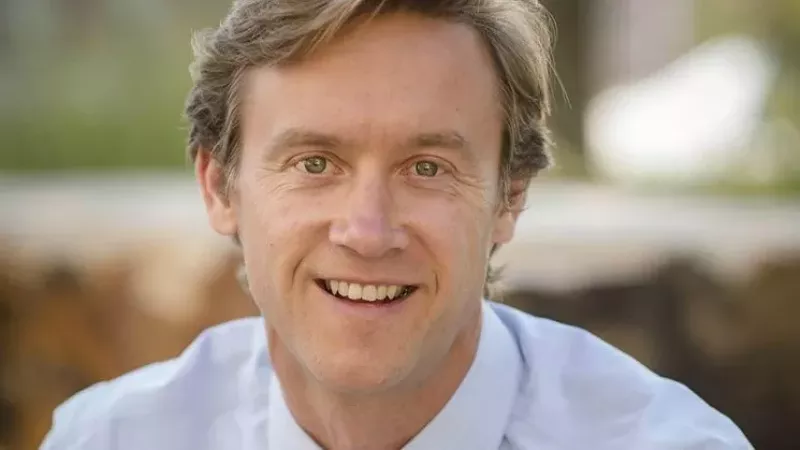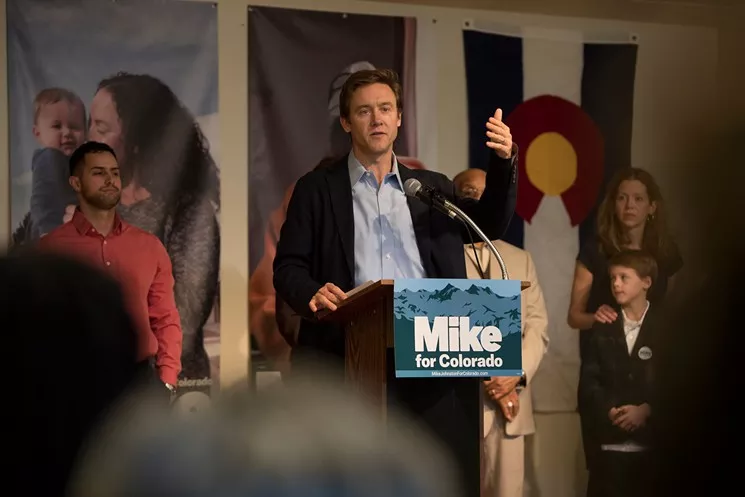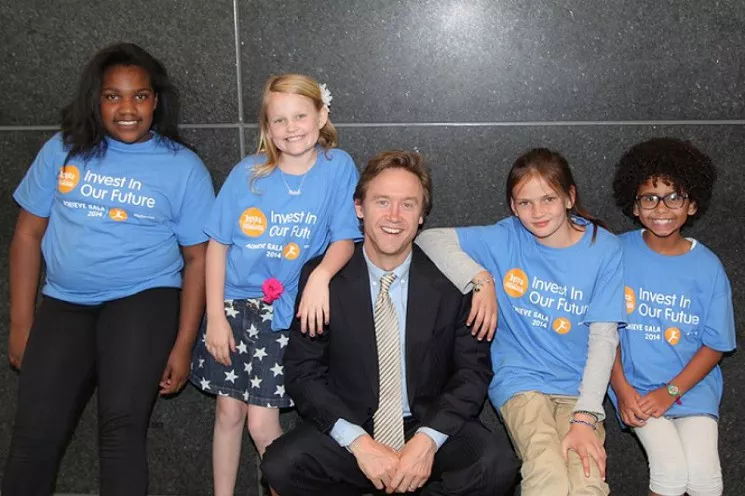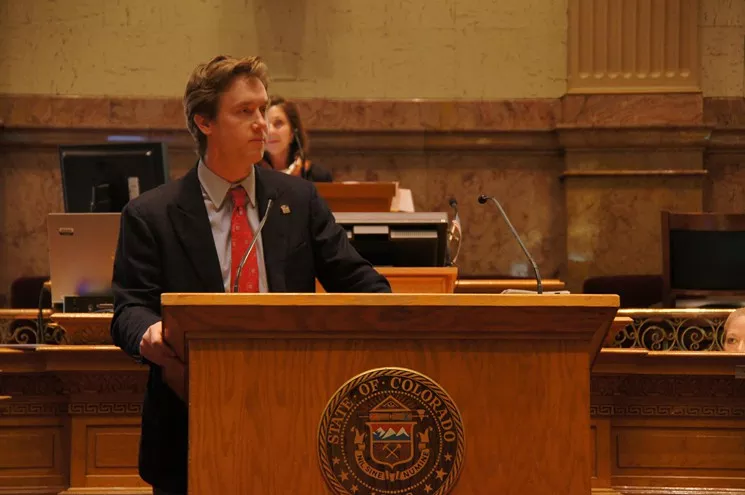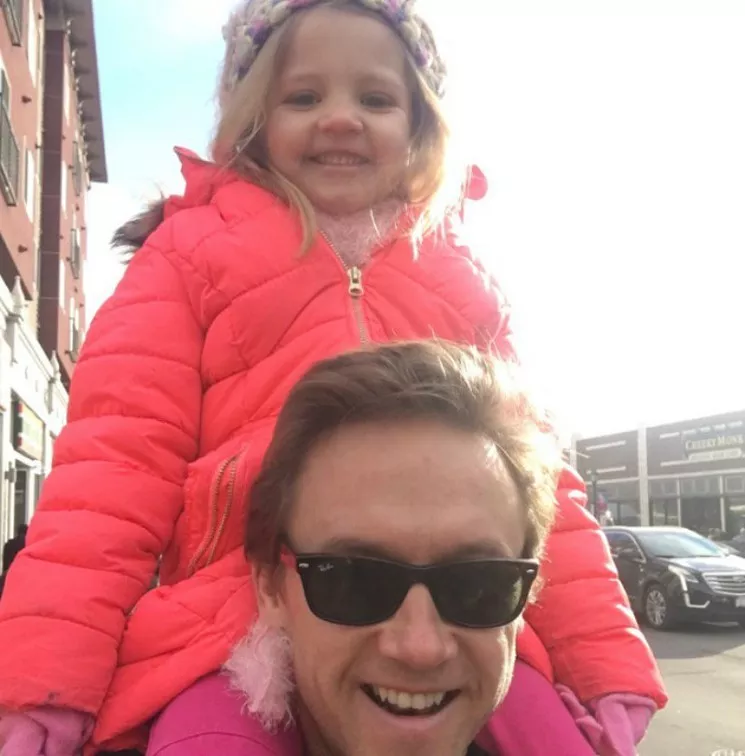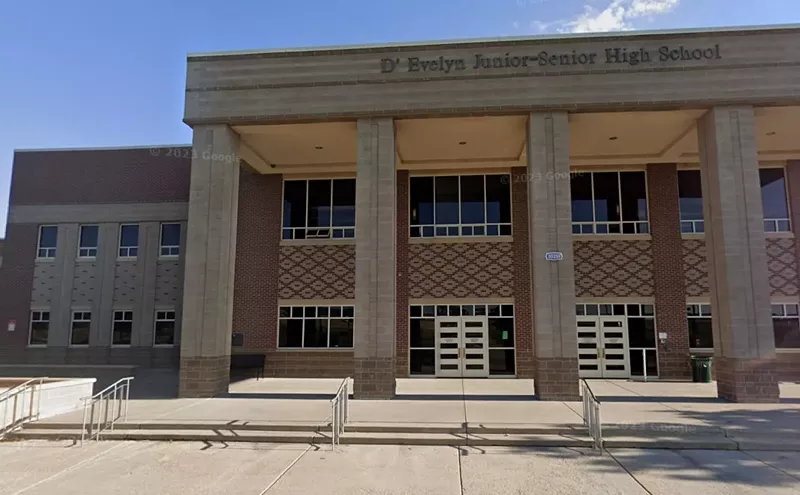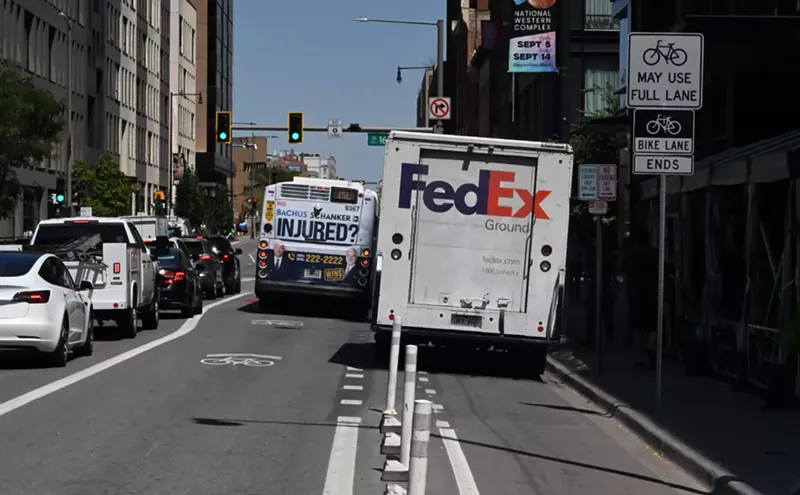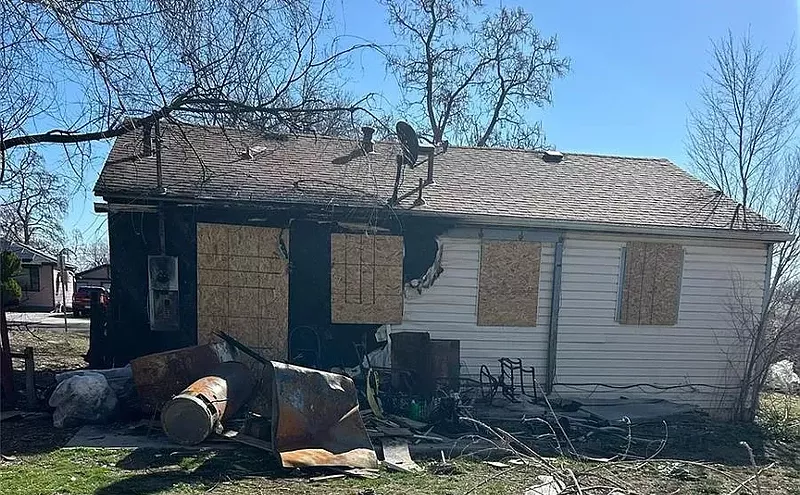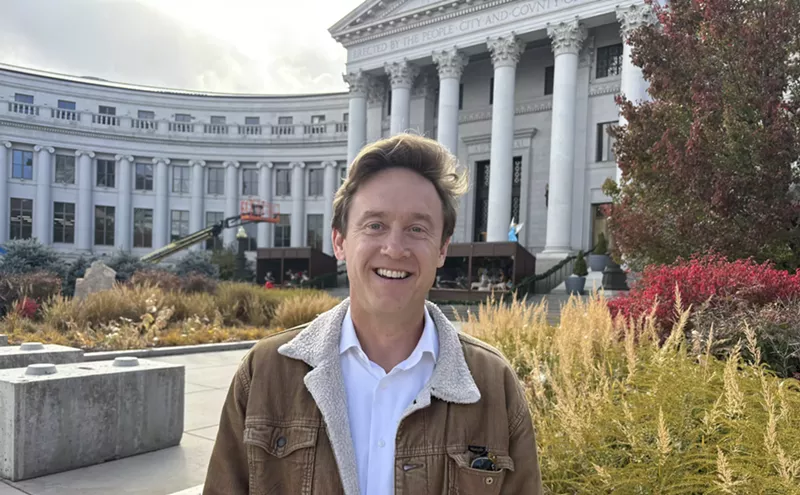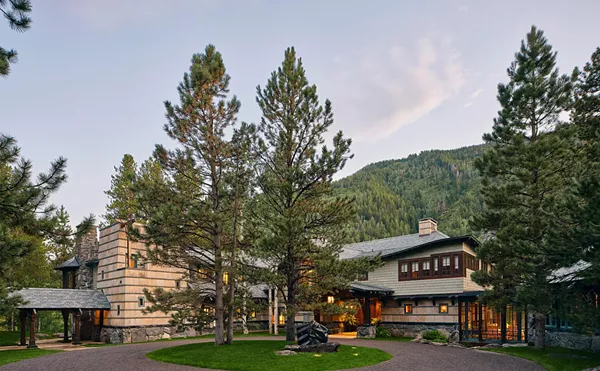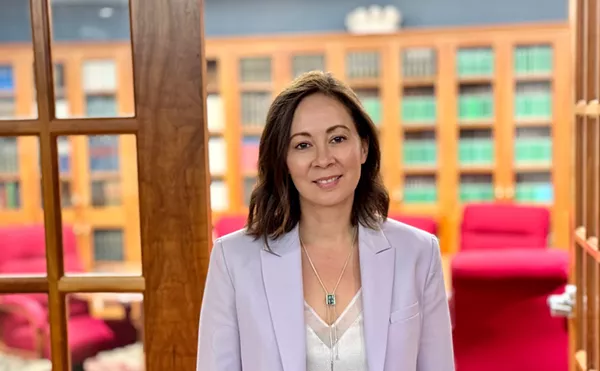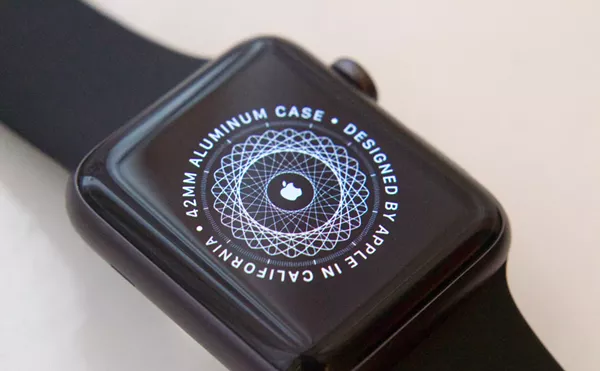"Ken Salazar has dedicated his life to protecting Colorado's land, water and people," Johnston says in a statement issued by his campaign. "We will need his counsel, creativity and courage to make the next chapter of Colorado history even more successful than the last."
Johnston struck a similar tone during a January interview with Westword shortly after beginning his current quest. When asked about the possibility of Salazar or Representative Ed Perlmutter deciding to compete for the job, he responded, "I have tremendous respect for those folks, and obviously, when people ask, I tell them, 'I have nothing but kind things to say. They've offered amazing service to the state for a long time.'"
He added: "I think the question for me was more, what is my vision for the state, and where do I think the state should go in the next twenty years? And if I think that vision is different from others', then I ought to share it and build a coalition of folks who believe in it and let the people decide. More and more, I think we're seeing that people want to see competing visions of where they think the state should go, and they want a fresh take on what Colorado is and where it's heading. I think I can provide that and look forward to doing it with whoever else gets in the race — having a thoughtful, respectful conversation about ideas. I respect all of those people. I'd welcome the opportunity to talk about the future of Colorado with any of them."
Right now, only one other Democrat has officially filed for inclusion in the 2018 race for governor: Noel Ginsburg, CEO of Intertech Plastics and founder of CareerWise Colorado. Johnston has a considerably higher profile, given his stint in the state senate and publicity he's received as an educational innovator; he worked as an education adviser for Obama when the then-senator from Illinois was seeking the presidency in 2008. But with Salazar out, Perlmutter or others could decide that the time is right to go after the state's top electoral position.
In the meantime, though, Johnston is in the driver's seat. Learn more about him from the following Q&A, originally published on January 25.
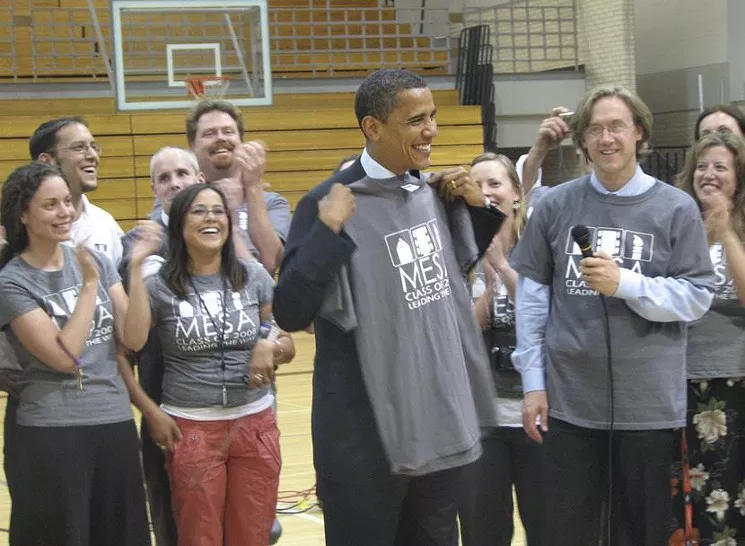
Then-senator Barack Obama with Johnston in 2008 at Mapleton Expeditionary School of the Arts in Thornton.
Photo by Mark Manger
Mike Johnston: I think the most important one is, how do we make sure Colorado is in a position to help drive the new economy and not be dragged behind the old one? What we've seen is that there's so much disruption coming to our world through globalization and automation and the changes in technology — all of these workers who've been in existing industries for generations that are seeing dramatic changes and dislocation. We're going to see up-and-coming people coming out of college and elsewhere who are going to experience eleven and twelve and thirteen different careers over the course of their lifetime. We have to prepare a system that helps to train and re-train them over the course of their lifetimes, so if they're at 45 and their industry dies or contracts, they have the infrastructure and the skills to get prepared for the next emerging industry.
That's why, the day that I launched, I introduced what I call the Lifetime Opportunity Promise, which is the opportunity for any Coloradan to have access, debt-free, to two years of either career training or post-secondary education as a way to get them the skills they need and the opportunity at the jobs they want in industries that are emerging. I think that's going to be the next economic and social driver of the country over the next ten to twenty years. I think that's by far the biggest one.
I think the other ones are what we can do to build a world-class education system that will keep up with that, in both the K-12 world and our early-childhood education. And I think the third is how does Colorado harness the infrastructure we need to support that, which is a question of transportation, it's a question of energy, it's a question of water, it's a question of natural resources and the built resources we're going to need to move people and products over the next thirty years. I think we have a looming crisis in all of those areas.
Regarding the debt-free college and training proposal, there's been some criticism about the lack of specificity you've announced so far. Do you have a plan to make it feasible? Or are you working on that right now?
I do have a plan, and we'll be coming out with a more comprehensive layout of the policy over the coming months. But the basic idea, which I think some folks didn't catch entirely in their reporting about it, is that it will be done in exchange for students offering meaningful service to the state. The idea is, they would be enlisted in a commitment to do service for the state that would include any number of resources that are really important. It would almost be like a National Guard, where they would do four or five weekends a year. It could be fire mitigation, it could trail repair, it could be flood prevention — things we need that are going to have impacts on the Colorado economy and the Colorado budget down the line if we don't attend to them. And if there are instances of a crisis or a catastrophe, that corps is available to be called up, almost like the National Guard. If they need to come in for three or four weeks to help clean up after a flood in Lyons, or after a fire in Waldo Canyon, the team is available to offer that kind of support. If you look at Lyons floods alone, we spent more than $100 million — a lot of it to outside contractors who came in to help deal with that crisis. So I think there is a clear way to demonstrate that the investment in workers would also be an investment in Colorado that could save the state money and avoid significant costs down the road....
The idea of state or national service has been out there for a while. Why has it been so hard to put something like that into place?
I think our plan is unique in that most other service proposals are all full-time service proposals. You'd be an AmeriCorps volunteer who's working sixty hours a week in a school, or you would be working for a WPA-style program where you're doing road and bridge repair fifty hours a week — full-time programs for full-time benefits, which makes them much more expensive and much more complicated to administer.... But the idea of the National Guard version is, you can still be an accountant for your day job, or a barista, or a teacher, and when Colorado calls you, you get summoned up. You can keep your day job and you're contributing to society every day. You're earning money each day. We're not talking about full-time service commitments. We're talking about more of a part-time commitment over a period of time that would enable you to be called up if there's a crisis. I think that's a more economically sustainable plan that has less overhead and infrastructure than some of these full-time national service plans.
Service is a big part of your own personal biography. How would you describe to folks who may not be that familiar with you how service has played a part in your life and career to date?
I think I've tried to spend my adult life and some of my adolescent life figuring out where it is I can make a difference in communities around me. That led to me being a schoolteacher in the Mississippi Delta [Johnston wrote a book about his experiences titled In the Deep Heart’s Core], it led me to running school programs in juvenile prisons in Colorado [through the Joan Farley Academy], it's led me to run a high school in Thornton, and it's led me to open a community center right here in Park Hill. We're partnering with nonprofits to get people back into jobs and keep them out of gangs — get them back into constructive roles as citizens. I think that's been a fundamental part of what I've done, and a much deeper and broader commitment to service. To me, service isn't something you do from a fancy office in Washington, D.C. It's something you do every day in the communities where you live and work. And I think I'll be unique in the field in that way. It's a long-term commitment.
I'm also a small-family business owner [the Christiana at Vail lodge]. I've spent my adult life running our family business. I also, I think, have the experience of someone who's grown up on both sides of the Colorado divide. I've grown up on the Western Slope; I have family and neighbors and friends there. And I think I understand some of the ways that the lived experiences of Coloradans are different whether you're in Denver or you're in Alamosa or you're in Grand Junction or you're in Gypsum. I think that consistent commitment of my lifetime of working in the service of others and also a diverse background in different parts of the state and working in small business, running a school and also serving as a state legislator, I think that brings a unique approach to how to run the state.
You're best known nationally as an education expert who advised President Obama in the 2008 campaign. Is there a fear on your part that you could be pigeonholed as a one-issue candidate just because people may know you better in that area than they know you in others?
I think I have a broad portfolio of stuff I've worked on through the legislature. I was in Grand Junction last week. I was the sponsor of a rural economic-development package called the Jump-start program, which folks in Grand Junction were saying could have potentially the highest impact of any piece of rural economic legislation they've seen in a generation. We've already grown seventy new businesses in Mesa County. More than 205 new jobs will be created there. So I think if you talk to different pockets of people around the state, they'll know me from different work. But I think what you'll find that's consistent is, here's a guy who had the courage to develop big and bold ideas, but who has the humility to sit down with anyone and work hard to get them done. I think that's true. If you talk to criminal-justice reform advocates in our neighborhood — I've actually carried more legislation on criminal-justice reform over the last five years than on education, if you can believe that, [from] a ban on the use of the chokehold by law enforcement to the CLEAR Act, which was on the cover of the Post a few weeks ago, about reducing disparities in the criminal-justice pipeline, to lots of work on protection of kids from child molesters and felony-DUI legislation. The more people dig, the more they'll find I have a consistent record of these kinds of big ideas with unusual coalitions in all parts of legislation. Even here in the daily activity of our community office — it's not a bill that you have to pass, but if you come out and see what we've done in the Holly in northeast Denver, it's been a real transformation over the past six years, because we've brought together folks like Phil Anschutz and folks like the Reverend Leon Kelly and Brother Jeff Fard to be able to help work toward a solution that works for this neighborhood. Most people don't build coalitions like this or, I think, get results like this.
Your state Senate term ended in 2016. Were you already thinking about running for governor then? And if not, when did you start focusing on that goal?
Folks had been asking me about it for a while, and I told them I'd give it some serious thought. Mostly just this past fall is when I started giving it serious consideration. I still have a nonprofit that I run and a consulting company [it's called Traverse LLC] and a business, so the plate is still plenty full of other things. But this fall, I sat down with my family and talked about what was the difference we thought we could make and whether it was the right time. My kids are the best. For my kids, the question was, do you think you can make a difference? And if you can, why wouldn't you do it? They have a way of making complex topics much simpler....
I think that was the deciding factor. And once they were all convinced that this was something we should do, we decided to do it.
Some big-name Democrats have been named as potential gubernatorial challengers, including Ken Salazar and Ed Perlmutter. Does the prospect of running against candidates with much greater name recognition give you any pause?
I have tremendous respect for those folks, and obviously, when people ask, I tell them, "I have nothing but kind things to say. They've offered amazing service to the state for a long time." I think the question for me was more, what is my vision for the state, and where do I think the state should go in the next twenty years? And if I think that vision is different from others, then I ought to share it and build a coalition of folks who believe in it and let the people decide. More and more, I think we're seeing that people want to see competing visions of where they think the state should go, and they want a fresh take on what Colorado is and where it's heading. I think I can provide that and look forward to doing it with whoever else gets in the race — having a thoughtful, respectful conversation about ideas. I respect all of those people. I'd welcome the opportunity to talk about the future of Colorado with any of them.
Some of the early commentary about you after your announcement characterized you as being part of the left-leaning, most progressive part of the Democratic Party, and there have been references to Bernie Sanders. Are you comfortable with those characterizations? Or do they seem like attempts to marginalize you as a candidate coming from outside the mainstream?
When people ask about it, I say there are commitments that Bernie and I share and things I really respect about what he's done. I didn't take any PAC money when running as a state senator, and I won't when running for governor. We're having a deep focus on community organizing and really lifting up the voices of ordinary people to regain their government. I think that commitment to community organizing to give people a voice in government and not just a vote, combined with some of the organizing beliefs he has — I really share the belief that we need to make post-secondary education accessible and affordable. So I think those are the things people have picked out as commonalities, and I'm certainly excited about those.
I think there are also a lot of ways I've built bridges with Republican leaders and business leaders that I'm proud of. But obviously I think he's done an amazing job of inspiring people who want to improve their state and the country, and we're going to try to do the same thing.
One of the takeaways from the 2016 campaign has been that the Democratic Party needs new, young leadership. Do you see your candidacy as part of that effort?
I do think there have been a lot of folks who've said they're really excited to chart a course for where the state and the party goes over the next twenty years, and a lot of folks who've said they're excited because they think I represent some of the ideas about where the state can go. Obviously, I believe that I have a different and fresh vision of what Colorado is capable of. I hope that will command the energy and the commitment of a lot of people as we move forward.
As I mentioned earlier, you've received quite a bit of national attention. Time magazine highlighted you in a piece about forty political leaders under forty back in 2012, for example. Do you have national ambitions? Or are you focused on Colorado right now?
I'm entirely focused on Colorado. I'm an entrepreneur at heart. I've started schools, I've started businesses, I've started this community center. I try to look at the question not as what do you want to be, but what do you want to change, and what role do you want to be in to make that change. And I think there's a real moment right now to change and influence Colorado to become the first state to really be ready for the economy that's coming. If we get that right, we can create a template for the rest of the country to follow. But this is 100 percent about, can we build a little city on the hill here in Colorado — where we have some big ideas and we can build a coalition to get it done and can create opportunities for people to thrive in whatever place, small town or big city, where they live. I think that's the exciting opportunity right now, the one I'm all in for.
If you look at the headlines today, I've been fighting for five years on this issue of Amazon, trying to create fairness between online businesses and other businesses to try to make sure Amazon pays its fair share of sales tax to support local industries. I sponsored that legislation, they sued us over it, we fought over it, we finally won at the Supreme Court six months ago, and today, they're going to be here and they're going to be opening a new factory with 1,000 jobs in Aurora. We found a way to create an economy that works for all Coloradans, and everyone pays their fair share — but also that we see the new economy's coming and it's not bringing back old manufacturing jobs. It's going to bring new distribution jobs and new ways of getting services to people. We want to be at the forefront of that and leading it, not sort of tagging behind it. I think that's the sort of thing where if you're willing to think differently and build different types of coalitions, we get different kinds of economic opportunities in a way that's fair to Colorado workers.
You're the first major Colorado gubernatorial candidate to have started a run. Why did you start so early? Or do you even consider this to be early?
There are two reasons. The most important one is, as I was saying before, the opportunity to really engage Coloradans statewide in an authentic conversation of where we are and who we are and what we want to get done — who we are as a state. I think that's a much more in-depth conversation than just a nine-month fly-by where you spend a bunch of money on TV ads and try to make phone calls to get people to vote. We're interested in more about people than just their votes. We want to have them really engaged and owning the process of starting to move Colorado forward, and to me, that takes a more in-depth conversation than one that you rush.
Second, I think there's a powerful movement of people from, I'd say, both sides of the aisle who feel like what they've seen in national politics doesn't represent who we are or what we believe or what we want to be about. I think there's some real passion and excitement about, let's build Colorado into something different. Let's build an exemplar here of how politics can run in an era when it's still possible to have the courage to generate big ideas, but also to still have the collaboration to get everyone at the table to get things done. That's how Colorado has been for a long time, and I think that's how people want it to be again. And so that excitement certainly inspires me. It takes time to build things that will make a difference. And that's what we're going to try to build.
You mentioned your recent trip to the Western Slope. This last election, we heard a lot from voters who were unhappy with the focus on cities and urban areas and felt that smaller towns and rural communities were getting short shrift. Was that one of the reasons for your visit — to let people beyond the metro area know that they're part of Colorado, too, and their concerns are ones you want to address?
That's exactly it. The very first day after we launched, we drove down to the San Luis Valley and had a dinner with farmers and ranchers and small-business leaders there. As you know, there's no media market there, there are no TV channels there, there's no press there. That's not what you do if you're trying to do a media release. But it is what you do if you're trying to start a real conversation with the Coloradans who feel that they've been left behind and where they want to see their state go. So we went to Pueblo on the way down, we went to the San Luis Valley, and then we went to southwestern Colorado and up through Grand Junction. All of our conversations in those first few days were with people in small towns who feel that they've been left behind and been left out — people who have real entrepreneurial visions of things they want to get done and some real challenges that we need to address. Having grown up on the Western Slope and having a brother and sister who still live in Gypsum, I think that diversity of geography when it comes to the people of the state really matters to me. But we wanted to make clear that this has got to be a campaign about all of Colorado, which is why we need to listen to folks who think they have the least amount of voice in the current process.
I saw on your social media that you took part in the Women's March in Denver. What was your impression of that event? And in some way, do you think that symbolized the kind of Colorado that you'd like to lead?
I just found that event to be incredibly inspiring. It had the kind of sense of a Colorado where everybody belongs — where people were inclusive about differences, where everybody was not only tolerated, but supported. I believe there's a way to both be different and be connected, and I think what you saw was a real strong engagement. I saw a bunch of my neighbors there who I know for a fact have not been engaged in politics before. They're just not political people, but they are people who feel that the brand their country has been given is not who they are, and they want to take ownership over this state speaking for them and speaking for their values and their background. I found that really inspiring and found it to be testimony that there are a lot of regular folks who want to get involved. This election was a wake-up call that we can't fundamentally leave the public square for other people to solve. If it's going to be public, it's got to be all of us, and we've got to lean in to build something significant. For me, that's exactly the kind of coalition we're going to try to put together over the next few years, not just as a strategy for campaigning, but, more importantly, as a strategy for governing. Having those folks in a day-to-day conversation about where we're going and how we get there — I think that's what makes this worth doing....
I hope that folks will come take a look and get involved. We're going to try to build the type of movement that really hasn't been built in Colorado for a while in a statewide campaign. We're really going to engage local leaders to be voices for their own values in communities all over the state, and we'd love to have people come join us.
(Disclosure: My daughters will be taking part in Johnston's Urban Leaders Fellowship this summer.)

